The Trump administration does not have the authority to use military funding to pay for construction of a border wall, a federal appeals court panel ruled on Friday.
In a 2-1 ruling, a 9th U.S. Circuit Court of Appeals panel found that diverting $2.5 billion Congress had appropriated for the military violated the Constitution and is unlawful.
The executive branch "lacked independent constitutional authority to authorize the transfer of funds," the ruling said. "These funds were appropriated for other purposes, and the transfer amounted to 'drawing funds from the Treasury without authorization by statute and thus violating the Appropriations Clause.' Therefore, the transfer of funds here was unlawful."
The decision upheld a ruling by a federal judge in California who last year found that the Trump administration's funding scheme was against the law. A coalition of states led by California had filed suit to block the move.
California Attorney General Xavier Becerra praised the appeals court's ruling.
"Today, the court reminded the president — once again — that no one is above the law," Becerra said. "We applaud the court for taking action to immediately halt Trump's unlawful money grab."
The administration commandeered the military money last year after Congress refused to appropriate money for the wall. The president declared a national emergency at the border in order to access the money from the Pentagon.
The U.S. district court judge, Haywood S. Gilliam Jr., found the administration failed to prove the money was needed for "unforeseen military requirements."
The appeals court agreed, noting problems with drug smuggling at the border is "a long standing problem" and not "unanticipated or unexpected."
In his dissent, Judge Daniel Collins said the administration had the authority to use the money.
The majority judges, Sidney Thomas and Kim McLane Wardlaw, were nominated to the court by Bill Clinton, while Collins was a Trump nominee.
The Department of Justice is likely to appeal the ruling to the U.S. Supreme Court. A spokeswoman for DOJ declined comment.
The high court has weighed in on the matter once before, in a related case involving the Sierra Club's legal challenge to the emergency wall funding. Gilliam ruled in favor of the Sierra Club's request for an injunction blocking the administration's plans, but the Supreme Court questioned whether the group had legal standing to get involved and issued a stay of Gilliam's order.
That allowed the administration to tap into the military funds while the appeal to the 9th Circuit was pending.
The administration has already awarded much of the money, including a $1.3-billion job in Arizona that was announced last month. Trump visited Yuma, Arizona, on Tuesday to mark completion of the 200th mile of border wall during his administration, much of it with the transferred military funds that the 9th Circuit panel found illegal.
A spokeswoman for Becerra, Sarah Lovenheim, noted that of the fencing that's been built up so far, just three miles' worth is new construction.
After the $2.5 billion transfer of military funds, the Pentagon diverted another $3.6 billion that another appeals court, the 5th U.S. Circuit Court of Appeals, ruled in January could be spent. California is also challenging the additional tranche of funding in another lawsuit.
In a separate ruling Friday, the 9th Circuit found the Sierra Club did have standing to sue. The panel said the government was proceeding with border wall construction without ensuring compliance with any environmental regulations, thereby harming the interests of Sierra Club members who visit the border region for hiking, bird watching and other recreational activities.

